All Articles
Legislative and Regulatory Update
April 2009 by Scott Harn
• Dredging bill needs your attentionAnother bill has been introduced in California to ban suction gold dredging. This latest attack comes courtesy of California State Senator Patricia Wiggins, a Democrat in the Santa Rosa area.
Wiggins introduced SB 670 in the California Senate on February 27, 2009, designating it as an “urgency statute.”
The bill calls for the closure of all California streams and rivers to suction gold dredging until the California Department of Fish & Game “has completed the environmental review of its existing suction dredge mining regulations, as ordered by the court in the case of Karuk Tribe of California et al. v. California Department of Fish and Game et al., Alameda County Superior Court Case No. RG 05211597.”
The environmental issues related to suction dredging have been addressed in numerous studies over several decades. Each study has come to the same conclusion—suction gold dredging is a de minimus activity, which means that it has no significant impact on the environment.
The best summary of suction gold dredge studies I have read so far was completed in 2007 by Joseph C. Greene, a research biologist who recently retired from the Environmental Protection Agency.
After reviewing all of the available data, Greene summarized his findings in a report for the California State Water Resources Control Board. Greene determined that suction gold dredging does not negatively impact water quality, fish, turbidity, water temperature, water chemistry, mercury pollution or the environment in general.
Greene concluded, “The issue of localized conflict with suction dredgers and other outdoor recreational activities can be put into a more reasonable perspective using the data provided... The issue against suction dredge operations in the streams of the United States appears to be less an issue of environmental protection and more of an issue of certain organized individuals and groups being unwilling to share the outdoors with others without like interests.”
The Next Step
California State Senators and Representatives will be asked to vote on this bill. It is up to you to educate them.
If you live in California, please contact your Senator and Representative. Feel free to use any part of this article to help you state your case, and include a copy of the study conducted by Joseph C. Greene. Explain to them that you would like a response indicating how they will vote for this bill when it comes up for vote. Politely make it clear that you will not vote for them at the next election cycle if they are in favor of the bill. You should also provide them with an estimate of your spending for fuel, food, supplies, lodging, etc., related to your dredging activities to help them understand that this will negatively impact the economy in California.
If you are outside of California but dredge in the state, feel free to contact the Senator or Representative for the district where you dredge and provide them with a summary of your spending as stated above.
Here are some links to assist you:
- California State Senate District Map (Click on the district and you will be redirected to the website for that Senator)
- California State Representative Map (Click on the district and you will see the contact information for that Representative)
- Summary of Suction Gold Dredge Studies, Joseph C. Greene, Research Biologist, EPA (retired). Adobe .pdf format; Microsoft Word format
- SB 670 (.pdf format)
• Miners take the offensive
For several years, the Karuk Tribe of northern California has tried to shut down suction gold dredging in northern California streams and rivers through the use of lawsuits and petitions. They have continued to claim that suction dredging is detrimental to Coho salmon and the environment despite the numerous studies that contradict their claims.
There is no dispute that the Coho salmon population has been declining. The irony is that while the tribe is battling various logging, farming, and mining organizations, the tribe itself has been using nets to capture and kill Coho salmon, a federally protected species.
On March 2, fourteen groups banded together and petitioned the California Fish & Game Commission to stop this unregulated activity.
The New 49’ers issued a press release that stated, “Although the Karuk Tribe has no federally-recognized fishing rights, the Commission has given the Karuks special rights to take salmon from an otherwise closed portion of the Klamath River. ‘At a time when the federal government is poised to ban ocean salmon fishing for the second year in a row, it makes no sense for the State to turn a blind eye to the wholesale slaughter of salmon by the Tribe,’ according to Mike Higbee of Grants Pass, Oregon.
“Speaking on behalf of the coalition, a local resident of the Klamath River, Jim Foley, pointed out that it is very irresponsible for the State of California to impose crippling regulatory burdens upon everyone else, while completely ignoring the Karuks who are likely killing more salmon than all other activities combined.”
• Cap-and-Trade legislation
It looks like cap-and-trade regulations will be introduced soon from the Obama Administration, based on the assumption that carbon dioxide emissions are causing climate change.
We use the term “assumption” because we feel the debate on human caused climate change is far from settled. We are not alone. As reported in the Legislative Update column in our January 2009 issue, over 650 international scientists—like Dr. Kiminori Itoh, an environmental physical chemist and a member of the UN Intergovernmental Panel on Climate Change—have united to debunk global warming claims.
Warming fears are the “worst scientific scandal in the history… When people come to know what the truth is, they will feel deceived by science and scientists,” said Itoh.
Frederick Seitz, former president of the National Academy of Sciences, states, “Research data on climate change do not show that human use of hydrocarbons is harmful. To the contrary, there is good evidence that increased atmospheric carbon dioxide is environmentally helpful.”
Over 31,000 American Scientists have signed an online petition in support of Seitz’s opinion. (You can view this information online at: www.oism.org/pproject/)
More recently, a group of 28 Senators, including Republicans and Democrats, sent a letter to the White House questioning the tactic of avoiding open debate on the proposal by including it in the budget bill.
President Obama claims the cap-and-trade legislation is not a new tax; however, the President plans to auction cap-and-trade credits. Energy companies and other emitters of carbon dioxide would purchase credits, and this new cost of doing business would undoubtedly be passed on to consumers through higher prices. In the end, it’s the American taxpayer who will foot the bill if cap-and-trade legislation passes.

Precious Metals in the Patagonia Mountains
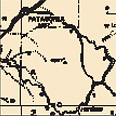 The Patagonia Mountains are a small but rugged mountain range that adjoins the Mexican border some 9 to 16 miles east of the border town of Nogales. The range trends northerly for 14 miles and is about 10 miles wide, reaching an elevation...
The Patagonia Mountains are a small but rugged mountain range that adjoins the Mexican border some 9 to 16 miles east of the border town of Nogales. The range trends northerly for 14 miles and is about 10 miles wide, reaching an elevation...
Using Geologic Maps
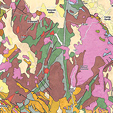 In order to see what geologic maps can do, we need to think about what we are looking for.
In order to see what geologic maps can do, we need to think about what we are looking for.
Tips for Effective Drywashing
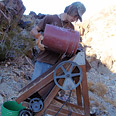 Back in October I read with great interest Chris Ralph’s article on the use of a metal detector while drywashing, and I wholeheartedly agree—I wouldn’t even consider going drywashing without using a metal detector in conjunction...
Back in October I read with great interest Chris Ralph’s article on the use of a metal detector while drywashing, and I wholeheartedly agree—I wouldn’t even consider going drywashing without using a metal detector in conjunction...
Miner's Cabin—Red Shack Territory
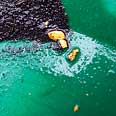 As we approached the river the view was outstanding and the sight was encouraging. A ravine coming down on the right side had been worked heavily, with rock piled back on each side. That surely meant there was gold somewhere close.
As we approached the river the view was outstanding and the sight was encouraging. A ravine coming down on the right side had been worked heavily, with rock piled back on each side. That surely meant there was gold somewhere close.
Prospecting for Rare Earth Metals
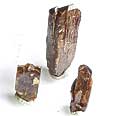 Rare earth metals are critically important to many forms of modern technology, including most green energy saving applications, computers, televisions, and a number of military defense systems.
Rare earth metals are critically important to many forms of modern technology, including most green energy saving applications, computers, televisions, and a number of military defense systems.
Gold Placers of Southern California
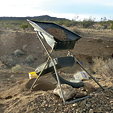 I grew up in Southern California, and found my first nugget there, so I know my way around. Because there is good gold there, I thought it might be helpful to take a look at the many placer gold opportunities found in the southern part of the state.
I grew up in Southern California, and found my first nugget there, so I know my way around. Because there is good gold there, I thought it might be helpful to take a look at the many placer gold opportunities found in the southern part of the state.
Over The Divide—Merwin (Merv) H. Hemp
It is with great sadness that we inform you of the passing of one of our long time members and tireless workers, Merwin H. Hemp.
Subscription Required:
The Bawl Mill
• From The Editor
• Detecting Invisible Gold
• Finding Diamond Deposits With Your PC—Part I
• Has Senator Harry Reid Worn Out His Welcome?
• The Most Obvious Place
• The Gold of Yuba County
• PDAC 2009 Convention Highlights
• Stimulus Package Provides Potential Tax Savings For Miners
• Melman on Gold & Silver
• Mining Stock Quotes, Mineral & Metal Prices








